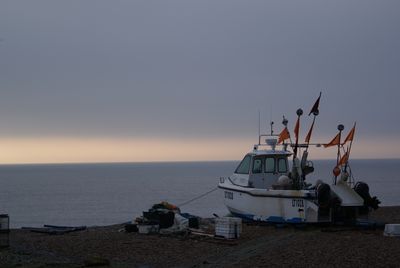Aldeburgh, part 2: A word with Kathryn Hughes
BY MICHAEL CAINES
As mentioned previously: Aldeburgh might be windy and wave-beaten, but it hosts an impressive literary festival. One of the running themes this year was life-writing of one sort or another – from novelists (Adam Mars-Jones and Jon Cantor) discussing their own relationship to the protagonists of their novels, to a former Chancellor of the Exchequer-turned memoirist (Alistair Darling).
The biographer Kathryn Hughes was also there; we sat in a hotel and talked about Lives and Life-writing. Those capital letters daunted me into asking all kinds of absurd questions, which Kathryn took very well, all things considered . . . .
Along with teaching at the University of East Anglia and writing for the Guardian, it turns out that the inspiration for her current work lies partly in the biographical essay, as it was practised many years ago by Lord David Cecil et al. Such essays might be pleasurable to read still, but they may also be dismissed as "quite quaint". Can the form now offer more than just a bellelettrist ramble around a person's life? Are they the antidote to the traditional cradle-to-grave Life? Assuming anybody needs an antidote, that is. "Look at how popular Claire Tomalin's Dickens book is", Kathryn says, "clearly, people do really enjoy [cradle-to-grave] life stories."
But the field is also more open now for would-be biographers: at the University of East Anglia, where she teaches, "what they seem to be really excited by is the idea that anything is possible – that they can follow their subject in all sorts of ways. They could just write about six months in the life or they could follow their subjects on a particular journey. There are infinite ways of doing it".
For Professor Hughes, then, such excursions down the "byways of biography" reflect a new openness in the genre; they enable her to pursue biographical enquiries that, in a conventional Life, would "bend the main narrative out of shape": "you get a completely different sort of story". That could mean tracing the origins of something as superficial yet significant as an unspoken dress code, or researching George Eliot's early life and working out its relationship to her fiction. That's quite a change from the situation familiar to those "middlebrow lady biographers" of the mid-twentieth century, whose neglected volumes turn up from Abebooks with a squashed moth inside. (Again, like the biographical essayists, Kathryn is quite fond of these, I think.)
(Digression: we're interrupted by an old chap looking for his pen. Has that biographer made off with my pen?, he's thinking. Anything's possible. But I digress . . . .)
Surely that woeful notion that literary biography is somehow a disreputable, unnecessary business no longer has any purchase?
"The classic argument against biography was always: it stops people reading the work", Kathryn says, "it actually presents them with rehashed gossip, which they read instead of going back to the work."
I hope she's about to say that this is quite untrue.
"I think there's an element of truth there."
Well, yes, I suppose . . .
"It would be madness to say that that's not the case."
Absolutely.
"In the decades of New Criticism . . . the idea of reading biographically about something would have seemed ridiculous and rather silly. I do think, thanks to New Historicism and other intellectual movements, you can move in and out of novels and lives, and you can make connections. It's not naff anymore . . . ."
It can even make itself useful around the place: "Mrs Gaskell's biography of Charlotte Bronte was so dominant that everybody just assumed that those poor girls sat in the parsonage with the wind howling round, never went out." But Juliet Barker's work on the Brontes "shows that Haworth isn't cut off, they get three newspapers a day, a great traffic of carriages . . . so in that sense, biography does quite useful things, because then we read Jane Eyre differently".
I thought of that point the following day, when Claire Tomalin repeated a point from her cradle-to-grave Life of Dickens, about how Jane Eyre might have influenced him, even though he didn't read it. . . .
Peter Stothard's Blog
- Peter Stothard's profile
- 30 followers




